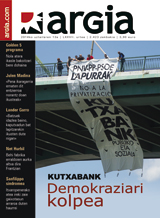First steps in the privatization of Basque public savings banks
- BBK and Caja Vital have taken another step towards the privatisation of the Alavesa box. After centuries and a half of history, the savings banks have been dissolved, converted into bank foundations, and they have appointed the employers that will govern from now on.

The assemblies held in Vitoria-Gasteiz and Bilbao have taken a decisive step in the privatization of the public bank Kutxabank, which emerged from the merger of the savings banks of the Basque Autonomous Community: so far the boards that have been the main centres of power of the Caja Vital alavesa and the BBK of Bizkaia have given their approval to their proposal for transformation into foundation.
The Gipuzkoan Fund, the third leg of Kutxabank, took over this decision until the autumn of this year. The privatization broke the line of the public bank that since the creation of the Municipal Savings Fund of Vitoria-Gasteiz in 1850 has been gestating in Hego Euskal Herria – the traumatic collapse of the Navarre Fund took place earlier.
The transformation of savings banks into private banks has sparked a great deal of controversy. The previous processes of concentration were more reassuring, first to unify the two that each territory had and then to integrate the CAV into one. This happened in 2011. But in addition to the need to better organise the banking business, the 2008 financial crisis has conditioned the steps taken in recent years. In addition to the outbreak of the credit business of the United States and Europe, the Spanish State evidenced the effects of the bubble that fed the banks, and in these cases the public savings banks. Although the situation of the Basque banks was not as catastrophic as that of many others in Spain, there was a need to pay the bets made by those here; investments in real estate speculation and the purchase of the defeated Caja Sur Andaluza Caja Sur, have today unbalanced the foundations of what is Kutxabank. In this very difficult situation, orders have come from Europe to privatise all public services, including banking.
The path of privatisation is no longer reversed. In the assemblies made up of clients of the banks, workers and promoters – representatives of the local administrations – political parties with an absolute majority in the institutions, the PNV, the PSE and the PP, there have been no outbreaks. To defend the step taken, they argue that the need to privatize Kutxabank, which brings together more than half of the savings of Basque citizenship, has been dictated by Brussels and that the new law regulating the box sector in Spain leaves no other way out. On the contrary, those who oppose this - basically the coalition EH Bildu, the Basque unions ELA and LAB and some popular movements, supported by intellectuals working in the defense of public finances - believe that the new law still gives opportunities to maintain the public character of the boxes and denounce that it is the same parties that say that privatization is necessary those who have negotiated the law in Madrid.
The well-known banker and former politician Mario Fernández Pelaz, president of Kutxabank, already announced in February this year that 70% of bank capital would go to private capital. Since then, there has been a proliferation of those who denounce that this operation is “cooked” between two protagonists: on the one hand, the political establishment, represented in the CAPV by the PNV and the PP in Spain, called to collaborate with the PSE; on the other hand, the financial oligarchy of Bizkaia, also called “Gente de Neguri”, led by Argentinian Mario Bilbao himself.
Meanwhile, the banks of Álava, Bizkaia and Gipuzkoa have seen how since their creation the ability to do good and social work was reduced which was their main objective, selling the real estate protected by the generosity of local administrations in the history of more than a century to the foreign speculative funds, reducing the network of offices and workers spread out in the banking towns... From now on, the Government of Spain will be the principal employer of Kutxabank and not the Basque Parliament. The Ekai Group, which has made a strong criticism of privatization, has described this operation as a "coup d'état".
This is the end of the adventure of the managers established by the main political forces of the CAV, who want to continue to govern the restored bank, extending to Spain in the last decades and immersing themselves in the speculative operations of the same. The CAV has lost its most important financial instrument… and soon we will see the effect it has always had on the economic concert that the CAV has proudly shown as a characteristic of its autonomy.
Fundazio bihurtu ondoren, BBK eta Vital 15 lagunek osaturiko patronatu banaren esku geratu dira. BBKn 9 patrono EAJk aukeratu ditu, 3 PSEk, eta bana PP, CCOO eta independienteek. Vitalen aldiz, 8 PPren eskutik datoz, EAJk 4 aukeratu ditu, 2 PSEk eta bakarra CCOOk.
15 patronoetatik 12k euren ondorengoak aukeratu ahal izango dituzte bost urtean behin, eta 3 baino ez dira izango herritarren botoen ordezkatzaile, erakunde fundatzaileek aukeratuak izango baitira. Patronoek ez dute soldatarik izango, baina “konpentsazio ekonomiko” bat kobratuko dute. Horietako asko Kutxabankeko edo kutxak partaide diren enpresetako kontseilari ere badira, besteak beste, eta diru-saria jasotzen dute.
Patronatuaren helburu teoriko bat da kutxak despolitizatzea, patronoak “adituak” izatea. Bestela pentsatzeko arrazoiak badaude ordea, zeinek aukeratuak izan diren eta patronoen iragan politikoa ikusita. Horietako askok lotura estua dute alderdi politikoekin, higiezinen enpresekin eta patronalen elkarteekin. Hauek dira batzuk:
BBKren presidente Xabier Sagredo EAJren Bizkai Buru Batzarreko diruzain izan zen eta egun Iberdrola Generación-eko kontseilari da. Ana Urquijo Atheltic-eko presidente ohia ere patrono izango da; higiezinen enpresa bat dauka. Atheltic-ekin loturak dituen jende gehiago ere bada patronatuan, hala, Jon Berasategui klubaren kudeatzailea proposatu du EAJk BBKren patrono izateko; Berasategui San Mames Barria SLren apoderatua da –BBK-k proiektu urbanistikoaren finantzazioan parte hartu du–. PSEk berriz Mikel Cabieces aukeratu du patrono BBKn, Espainiako Gobernuaren EAEko delegatu izandakoa eta egun Bizkako banku-fundazioaren administrazio kontseiluko kide.
Vital Kutxako patronoen artean nabarmentzekoa da PPk aukeratutako Gustavo Antepararen curriculuma: Ajebask, euskal enpresari gazteen elkartekoa eta Espainiako CEOE patronaleko batzarreko kidea da; Gasteizko Udal Hirigintza Elkartean kontseilari kargua du. Fernando Raposok berriz, SEA Arabako patronalean ardurak ditu eta Maria Teresa San Saturnino Arabako Emakume Enpresarien idazkari nagusi da. EAJk Vital Kutxako patrono izateko aukeratu du Monica Arbaiza, EAJko Araba Buru Batzarreko kidea eta Vitaleko administrazio kontseilaria. Koldobika Egurenek ardogintza enpresekin du lotura baita Kanariar Uharteetan jarduten duen hirigintza enpresa batekin ere. PSEk patrono aukeratutako Pablo De Oraá Arabako Batzar Nagusietako kide izan da bi legegintzalditan.
Belen Bilbao mediku eta militante feministaren, Argitan Emakumeentzako Aholku Etxearen eta Skolastika literatur proiektuaren ibilbidea aitortuko dute VII. Zirgari Sariek. Martxoaren 7an egingo da sari banaketa, Bilboko BBK Aretoan.























